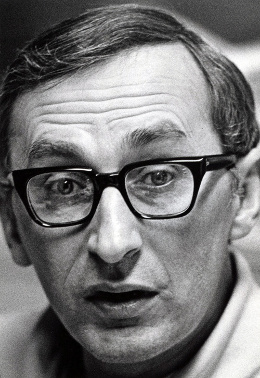
Michael Royko Jr. was an American newspaper columnist from Chicago, Illinois. Over his 30-year career, he wrote more than 7,500 daily columns for the Chicago Daily News, the Chicago Sun-Times, and the Chicago Tribune. A humorist who focused on life in Chicago, he was the winner of the 1972 Pulitzer Prize for commentary.

Louis "Studs" Terkel was an American writer, historian, actor, and broadcaster. He received the Pulitzer Prize for General Nonfiction in 1985 for The Good War and is best remembered for his oral histories of common Americans, and for hosting a long-running radio show in Chicago.
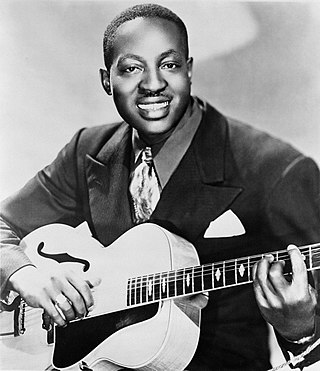
Big Bill Broonzy was an American blues singer, songwriter, and guitarist. His career began in the 1920s, when he played country music to mostly African-American audiences. In the 1930s and 1940s, he navigated a change in style to a more urban blues sound popular with working-class black audiences. In the 1950s, a return to his traditional folk-blues roots made him one of the leading figures of the emerging American folk music revival and an international star. His long and varied career marks him as one of the key figures in the development of blues music in the 20th century.
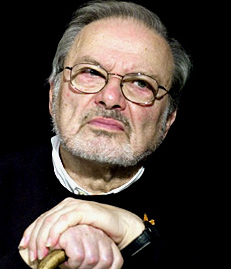
Maurice Bernard Sendak was an American author and illustrator of children's books. His book Where the Wild Things Are was first published in 1963. Born to Polish-Jewish parents, his childhood was impacted by the death of many of his family members during the Holocaust. Sendak wrote books including In the Night Kitchen, Outside Over There, and illustrated many works by other authors such as the Little Bear books by Else Holmelund Minarik.

The Yiddish Book Center Yiddish: ייִדישער ביכער־צענטער, romanized: Yidisher Bikher-Tsenter, located on the campus of Hampshire College in Amherst, Massachusetts, United States, is a cultural institution dedicated to the preservation of books in the Yiddish language, as well as the culture and history those books represent. It is one of ten western Massachusetts museums constituting the Museums10 consortium.

The Federal Writers' Project (FWP) was a federal government project in the United States created to provide jobs for out-of-work writers and to develop a history and overview of the United States, by state, cities and other jurisdictions. It was launched in 1935 during the Great Depression. It was part of the Works Progress Administration (WPA), a New Deal program. It was one of a group of New Deal arts programs known collectively as Federal Project Number One or Federal One.
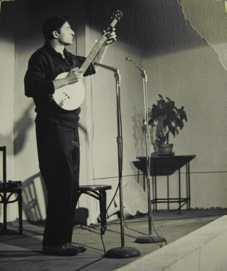
Fleming Brown, born in Marshall, Missouri, United States, was an American banjo player and one of the early teachers at Chicago's Old Town School of Folk Music. As an artist, Brown specialized in traditional songs of the Southern Appalachians. He was influenced by old-time banjo players such as Uncle Dave Macon and Dock Boggs. Brown supported himself as a graphic artist and as such never performed widely outside of Chicago.

Winfred "Win" J. Stracke was an American folk musician and co-founder of the Old Town School of Folk Music in Chicago, Illinois. Stracke was a Chicago fixture in music, theater, and television in the 1940s and was known for his booming bass voice. Nationally he was known as "Uncle Win" to viewers of his syndicated children's television show on NBC until it was canceled in the wake of the 1950s blacklist.
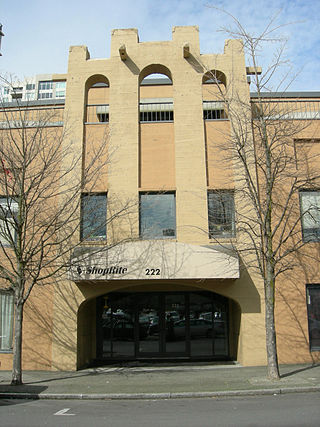
The Trianon Ballroom was the name given to a number of ballrooms in cities during America's big-band era. The first and most prominent Trianon opened December 6, 1922 in the Woodlawn neighborhood of Chicago, Illinois, and was marketed as "The World's Most Beautiful Ballroom". Designed by renowned theater architects Rapp & Rapp, it was owned and operated by William and Andrew Karzas, who opened the Aragon Ballroom in Chicago four years later. Its name and decor were inspired by the Trianon palace at Versailles. The main ballroom was 100 by 140 feet and was reported to accommodate 3,000 dancers, and the venue was one of the few places in Chicago that was air-conditioned at that time. To ensure that its guests befitted the elegant surroundings, it was the first venue in Chicago to enact a strict dress code, coats and ties for men and gowns for women, with "floor men" to enforce appropriate dress and behavior.
Ronald C. “Ron” Offen was an American poet, playwright, critic, editor, and theater producer. He received an A.A. from Wright College in Chicago and an M.A. in English Language and Literature from the University of Chicago.

Chicago literature is writing, primarily by writers born or living in Chicago, that reflects the culture of the city.
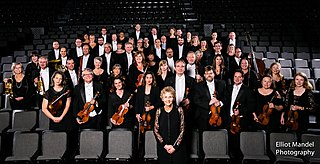
Music of the Baroque is an American professional chorus and orchestra based in Chicago, Illinois.

WFMT is a commercial FM radio station in Chicago, Illinois, featuring a classical music radio format. It is managed by Chicago's Public Broadcasting Service (PBS) member station WTTW's owner, Window to the World Communications, Inc. WFMT seeks donations on the air and on its website. The station's studios and offices are on North Saint Louis Avenue in Chicago.
The Media Burn Independent Video Archive preserves the work of early independent videotape and television production. Media Burn holds the largest collection of Louis 'Studs' Terkel video in the world and their 1992 presidential election collection has been deemed an American Treasure. Media Burn digitizes their videos for free online streaming. 1,500 of 6,000 videos are online, and topics range from Chicago history, American politics, mass media, and urban life. Media Burn is located in the River West neighborhood of Chicago, IL.
Elma Johnson Stuckey (1907–1988) was an African American poet and school teacher. Her poetry concerned the lives of black people from the days of slavery up through the late 1980s.
Eve Louise Ewing is an American sociologist, author, poet, and visual artist from Chicago, Illinois. Ewing is an associate professor at University of Chicago. Her academic research in the sociology of education includes her 2018 book, Ghosts in the Schoolyard: Racism and School Closings on Chicago's South Side, a study of school closures in Chicago. She is the former editor at Seven Scribes and the author of the poetry collection Electric Arches which was released in September 2017. In 2019, she published 1919, a poetry collection centered around the Chicago race riot of 1919. Additionally, Ewing is the author of the Ironheart comic book series for Marvel centered on the young heroine Riri Williams.
The American Archive of Public Broadcasting (AAPB) is a collaboration between the Library of Congress and WGBH Educational Foundation, founded through the efforts of the Corporation for Public Broadcasting (CPB). The AAPB is a national effort to digitally preserve and make accessible historically significant public radio and television programs created over the past 70+ years. The archive comprises over 120 collections from contributing stations and original producers from US states and territories. As of April 2020, the collection includes nearly 113,000 digitized items preserved on-site at the Library of Congress, and 53,000 items in the collection are streaming online in the AAPB Online Reading Room.
Steve Robinson is an American radio manager, producer and executive producer. He has held senior management positions with numerous American radio stations, including WFMT and the WFMT Radio Network/Chicago, WCRB/Boston, and public radio outlets WBUR/Boston, WGBH/Boston, KPFA/Berkeley, WBGO/Newark, Vermont Public Radio and Nebraska Public Radio Network. Robinson served as general manager of the statewide Nebraska Public Radio Network (1990–2000) and WFMT and the WFMT Radio Network from 2000 until October 2016.
Ollie Gilbert (1892–1980) was a folk musician from the Ozarks in Arkansas. She sometimes performed as "Auntie Ollie". Max Hunter recorded her singing more than 300 folk songs.

Making Gay History is an oral history podcast on the subject of LGBT history, featuring trailblazers, activists, and allies. Most episodes draw on the three-decade-old audio archive of rare interviews conducted by the podcast's founder and host Eric Marcus in the late 1980s and 1990s.












